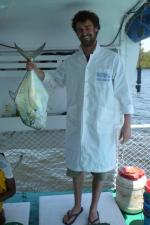I was born in Burgundy, France and grew up in Lyon, neither of which are really sea-related places. However, many of my childhood holidays were spent near the water at my grandparents’ home in Paimpol, on the North coast of Brittany. Fishing crabs at low tide, playing on shingle beaches, and walking along the coast were great occupations for young city boy! I was stunned as an adolescent to realize the decline of crabs and abalones available, compared to harvests I recall as a child with my grandmother. I also discovered scuba diving at age 13, and started diving with my family all around the world. This set me on the track to follow the passions of my youth, and study marine ecology and fishery sciences.
After my ‘baccalaureat’ (which marked the end of high-school), I studied for entrance into the French Grandes Ecoles during two years in ‘Classes préparatoires’. I entered Agrocampus Ouest (Rennes, France) and completed an agronomy engineer diploma specializing in fishery sciences and aquaculture in 2010. During my degree, I also did an internship at the Macquarie University (Sydney, Australia) under the supervision of Dr. Culum Brown to study the behavior of the rainbowfish. We examined behavioural traits and their link with the establishment of the hierarchy in male rainbowfishes. I completed my MSc thesis working with Drs. Didier Gascuel (Agrocampus Ouest) and Luis Tito De Morais (IRD). My research assessed the potential effects of a marine protected area (MPA), the Bolong de Bamboung, in the Sine Saloum estuary (Senegal). We used ecosystem modelling approaches (Ecopath and EcoTroph) to investigate the impact of the MPA enforcement between 2003 (last fished year) and 2006-2008 (three years after the closure of the fishery).
As a PhD Candidate, I am working with Dr. Daniel Pauly at the UBC Fisheries Centre, and with Dr. Didier Gascuel at Agrocampus Ouest thanks to a joint PhD agreement. My proposed research has been developed to address concerns about the potential impacts of fisheries on underlying trophic functioning at a global scale. The aim of this study is to better understand the trophic functioning and its variability throughout ecosystems. We propose to use two well-known trophodynamic models: Ecopath with Ecosim (EwE) and EcoTroph (ET). New insights into trophic functioning could be obtained from a large meta-analysis of the hundreds of EwE models developed since the end of the 1980s. Additionally, EcoTroph is a recently developed model incorporated as a plug-in of EwE that enables the comparative analysis of Ecopath models through a uniform framework, the trophic spectrum. Using these two tools, we propose to conduct a meta-analysis of the marine ecosystems trophic functioning and the related impacts of fisheries at a global scale. We will then develop a dynamic mapping of the fishing impact on ocean biomass and its trophic distribution.
Selected Publications
Colléter, M., Brown, C., 2011. Personality traits predict hierarchy rank in male rainbowfish social groups. Animal Behaviour 81, 1231–1237.
Colléter, M., Gascuel, D., Ecoutin, J.-M., Tito de Morais, L., 2012. Modelling trophic flows in ecosystems to assess the efficiency of marine protected area (MPA), a case study on the coast of Sénégal. Ecological Modelling 232, 1–13.
Colléter, M., Guitton, J., Gascuel, D., 2012. An EcoTroph modelling package for R [WWW Document]. EcoTroph Website, http://sirs.agrocampus-ouest.fr/EcoTroph/.
Colléter, M., Guitton, J., Gascuel, D., Accepted. An Introduction to the EcoTroph R Package: Analyzing Aquatic Ecosystem Trophic Network. R Journal.


